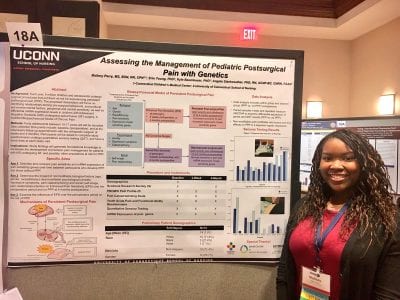Congratulations to Principal Investigator, Dr. Kyle Baumbauer, and Co-Investigator, Dr. Erin E. Young, on their $433,579 NINDS R21 award for Targeting Acid Sensing Ion Channel Subunit 3 (ASIC3) to Disrupt Nociceptor Sensitization Following Spinal Cord Injury (SCI). Most of what is known about the mechanisms underlying pain following spinal cord injury (SCI) has focused on changes occurring within the spinal cord. However, existing work has shown that primary afferents also contribute to the initiation and maintenance of SCI-induced chronic pain. The current study will examine the role of ASIC3 in the initiation of afferent sensitization and subsequent behavioral sensitivity. Dr. Baumbauer predicts that reduction of ASIC3 mRNA expression will attenuate the development of SCI-induced afferent sensitization and pain. Further, it is proposed that given the nature of SCI and the potential for early intervention, targeting ASIC3 at the time of injury may be effective at disrupting the processes underlying the development of persistent pain following SCI.
News
Call for submissions: CAMP -PRIM Fund
CAMP Pain Research Initiative and Maintenance (CAMP-PRIM) Fund: The purpose of this initiative is to support the research, scholarship and creative endeavors of junior researchers including junior faculty post-doctoral fellows, and graduate students in the field of pain research. The CAMP-PRIM is designed to support junior researchers in the initiation, completion, or maintenance of research projects, scholarly activities, creative works, or interdisciplinary initiatives that are critical to advancing pain assessment, measurement, and management. There will be two awards of $1500 for each grant in 2018. Please the guidelines for submission instructions. Please email a combined PDF of all materials to painresearch@uconn.edu by June 30, 2018.
CAMP Researchers receive UCONN-REP Award
Congratulations to Dr. Kyounghae Kim and her research team including Co-PI, Dr. Guoan Zheng, Co-I, Dr. Angela Starkweather and Collaborator, Dr. Erin E. Young, who have received a Research Excellence Program grant for $49,545 from the Office of the Vice President for Research. The title of the project is Development of a SPINE mobile application to improve low back pain self-management. The aims of the study are to: (1) adapt a lower back pain self-management intervention called “Sensitivity to Pain IN ME” or “SPINE” to a mobile format; (2) evaluate the feasibility and initial efficacy of the intervention, in a one-group pretest/posttest study, on self-management skills and outcomes in 50 patients (ages 45–65) with acute lower back pain; and (3) compare sensory and gene expression profiles between patients who recover within 12 weeks and those developing chronic lower back pain.
UCONN School of Nursing/ CAMP has strong participation at ENRS
UCONN School of Nursing/ CAMP was well-represented at this year’s Eastern Nursing Research Society annual meeting in Newark, NJ. Among the highlights was the presentation of the ENRS dissertation award to Mallory Perry, a PhD student. In addition Dr. Starkweather and the P20 team presented a symposium titled “Precision in Pain Self-Management across Populations”. The full list of SON faculty and students who presented or had a key role includes:
Workshops:
Establishing and Maintaining a Research Career: A Panel Discussion with Experts along the Path
Drs. Xiaomei Cong and Dr. Cheryl Beck
Symposium Sessions:
Precision in Pain Self-Management across Populations
Dr. Angela Starkweather : Precision in Pain Self-Management Across Populations
Dr. Xiaomei Cong:Self-Reported Pain, Pain Sensitivity and Gut Microbiome Pattern in Young Adults with Irritable Bowel Syndrome
Dr. Ruth Lucas, A Theory Guided Self-Management Intervention for Women Experiencing Breast and Nipple Pain During Breastfeeding
Dr. Angela Starkweather: Improving Precision in Self-Management of Acute Low Back Pain
Advancing Nursing Science in Precision Health: NINR P20 and P30 Centers
Dr. Angela Starkweather
Poster presentations
Dr. Deborah McDonald: Predictors of gastrointestinal bleeding in older adults: Results from the 2016 FDA Adverse Events Reporting System
Dr. Wanli Xu: Stress and Gut Inflammatory Responses in Modulating Neurodevelopmental Outcomes in Preterm Infants
Dr. Marianne Snyder: A Mixed Methods Study of Beliefs, Behaviors. and Experiences of APRNs with Lesbian and Gay Patients
Student poster presentations
 Mallory Perry, PhD Student
Mallory Perry, PhD Student
Assessing the Management of Pediatric Postsurgical Pain with Genetics
Jie Chen, PhD Student
Critical Care Nurses’ Perspective of Pain and Their Self-Reported Practices of Pain Assessment Toward Nonverbal Patients
Zahra Amirkhanzadeh Barandouzi, PhD Student
Do College Students have Adequate Knowledge about Sexually Transmitted Diseases (STDs)?
Courtney Lopiano, Undergraduate Honors Student
A Battle on Opiates: The NICU Nurse’s Perspective on Neonatal Abstinence Syndrome
Graduate student Mallory Perry receives ENRS Dissertation Award
Congratulations to Mallory Perry, BSN, RN, a School of Nursing PhD student, who has been selected as the 2018 recipient of the ENRS/Council for the Advancement of Nursing Science Dissertation Award. The award will be presented at the ENRS 30th Annual Scientific Sessions Anniversary Celebration Reception in Newark, NJ. Ms. Perry will receive $5,000 of funding in support of her research project, Assessing the Management of Pediatric Postoperative Pain with Genetics. Through this study Ms. Perry aims to examine: (1) relationships among pre-surgical behavioral, sociocultural and environmental factors, peripheral and central sensitivity measured by quantitative sensory testing, and mRNA expression levels of candidate pain sensitivity genes; (2) differential expression of pain sensitivity genes between adolescents who develop persistent post-surgical pain and those who do not; and (3) the influence of behavioral, sociocultural and environmental factors, postsurgical peripheral and central pain sensitivity, and mRNA expression of pain sensitivity genes on pain severity and interference over the postsurgical period.
CAMP Director Dr. Xiaomei Cong awarded $2.4 million grant
Congratulations to Dr. Xiaomei Cong, PhD, RN, who has been awarded a four year, $2.4 million grant from the National Institute of Nursing Research based on her R01 proposal titled Multi-Omics Analysis of Pain/Stress Impact on Neurodevelopment in Preterm Infants. Dr. Cong is an Associate Professor of Nursing and Director of the Center for Advancement in Managing Pain (CAMP). The study will be implemented with UConn Co-Investigators Erin E. Young, Jacqueline McGrath, Angela Starkweather, Joerg Graf, Jill Wegryzn and Ming-Hui Chen. The project includes sub-awards with the University of Connecticut Health Center, Connecticut Children’s Medical Center, and Women and Infants Hospital of Rhode Island. The goals of the project are to examine: 1) linkages between cumulative pain/stress experiences in the NICU and infant gut microbiome and neurodevelopment; 2) interactions among gut microbiome, host genetic variation and early life pain/stressors that contribute to neurodevelopmental outcomes, controlling for other infant factors; and 3) the impact of different levels of pain/stress experiences on the gut microbiome and neurodevelopment and other growth parameters using twin-pairs.
Joint Genomic Pain Symposium – November 30, 2017
The UConn School of Nursing, UConn Health and the Jackson Laboratory for Genomic Medicine will be holding a pain symposium in Farmington on November 30, 2017. See the flyer below for details!
 Loading...
Loading...
CAMP Researchers use genetic information to predict cancer patient pain
UConn researchers report in the June issue of Biological Research for Nursing genetic clues that may reveal which cancer patients are likely to be vulnerable to post-treatment pain.
Read the full article at UConn Today.
Dr. Kyle Baumbauer receives prestigious Rita Allen Foundation Award in Pain Research
Congratulations to Kyle M. Baumbauer, PhD, who has received the 2017 Award in Pain from the Rita Allen Foundation and the American Pain Society for his grant application, Targeting ASIC3 for disruption of nociceptor sensitization following spinal cord injury. Dr. Baumbauer is an Assistant Professor with a dual appointment in the UConn School of Nursing and Department of Neuroscience. The Rita Allen Award in Pain is a prestigious national award given to early career scientists in the field of pain research. Dr. Baumbauer’s project was chosen for three years of funding and a total of $150,000. The award letter noted that the competition this year was particularly intense. Dr. Baumbauer will be recognized at the upcoming American Pain Society Annual Meeting President’s Reception in Pittsburgh, PA on Thursday, May 18, at 7:00 p.m.
His project is focused on examining a novel role for Acid Sensing Ion Channel Subunit 3 (ASIC3) in the initiation and maintenance of nociceptor sensitization following spinal cord injury (SCI). The project capitalizes on the unique skills of his team, as one of the few in the country that can perform analysis of gene expression and electrophysiologically characterized nociceptors. Dr. Baumbauer’s laboratory is also one of few that examines the role of peripheral nociceptive neurons in the generation of pain following SCI. The proposed work is critical for our understanding of the nature of pain following spinal cord injury, in particular, and central nervous system insult, in general. With respect to SCI, the identification of a specific gene that can be targeted at the time of SCI would be a groundbreaking discovery that could revolutionize care for the spinally injured, as well as patient quality of life.
Dr. Ramesh and her WVU colleague Dr. Steve Kinsey talk about current evidence of marijuana’s medical benefits
 Currently 25 states and the District of Columbia have medical cannabis programs. On Nov. 8, Arkansas, Florida and North Dakota will vote on medical cannabis ballot initiatives, while Montana will vote on repealing limitations in its existing law.Despite claims that cannabis or its extracts relieve all sorts of maladies, the research has been sparse and the results mixed. At the moment, we just don’t know enough about cannabis or its elements to judge how effective it is as a medicine.What does the available research suggest about medical cannabis, and why do we know so little about it?
Currently 25 states and the District of Columbia have medical cannabis programs. On Nov. 8, Arkansas, Florida and North Dakota will vote on medical cannabis ballot initiatives, while Montana will vote on repealing limitations in its existing law.Despite claims that cannabis or its extracts relieve all sorts of maladies, the research has been sparse and the results mixed. At the moment, we just don’t know enough about cannabis or its elements to judge how effective it is as a medicine.What does the available research suggest about medical cannabis, and why do we know so little about it?
Read the full article on the Conversation and UCONN Today